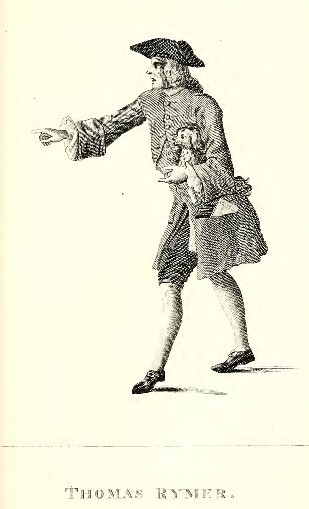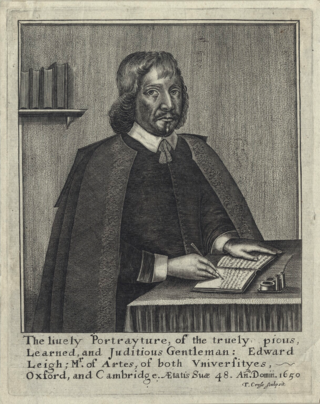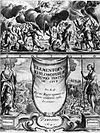
Thomas Hobbes was an English philosopher, best known for his 1651 book Leviathan, in which he expounds an influential formulation of social contract theory. He is considered to be one of the founders of modern political philosophy.

Bellum omnium contra omnes, a Latin phrase meaning "the war of all against all", is the description that Thomas Hobbes gives to human existence in the state-of-nature thought experiment that he conducts in De Cive (1642) and Leviathan (1651). The common modern English usage is a war of "each against all" where war is rare and terms such as "competition" or "struggle" are more common.

Leviathan or The Matter, Forme and Power of a Commonwealth Ecclesiasticall and Civil, commonly referred to as Leviathan, is a book written by Thomas Hobbes (1588–1679) and published in 1651. Its name derives from the biblical Leviathan. The work concerns the structure of society and legitimate government, and is regarded as one of the earliest and most influential examples of social contract theory. Written during the English Civil War (1642–1651), it argues for a social contract and rule by an absolute sovereign. Hobbes wrote that civil war and the brute situation of a state of nature could be avoided only by a strong, undivided government.
In ethics, political philosophy, social contract theory, religion, and international law, the term state of nature describes the hypothetical way of life that existed before humans organised themselves into societies or civilisations. Philosophers of the state of nature theory propose that there was a historical period before societies existed, and seek answers to the questions: "What was life like before civil society?", "How did government emerge from such a primitive start?", and "What are the hypothetical reasons for entering a state of society by establishing a nation-state?".

Thomas Rymer was an English poet, literary critic, antiquary and historiographer.

Samuel (de) Sorbière was a French physician and man of letters, a philosopher and translator, who is best known for his promotion of the works of Thomas Hobbes and Pierre Gassendi, in whose view of physics he placed his support, though unable to refute René Descartes, but who developed a reputation in his own day for a truculent and disputatious nature. Sorbière is regarded often by his position on ethics and disclosure about medical mistakes. In 1672 Sorbière considered the idea of being honest and upfront about a mistake having been made in medicine but thought that it might seriously jeopardise medical practice and concluded that it "would not catch on".

Sir Robert Filmer was an English political theorist who defended the divine right of kings. His best known work, Patriarcha, published posthumously in 1680, was the target of numerous Whig attempts at rebuttal, including Algernon Sidney's Discourses Concerning Government, James Tyrrell's Patriarcha Non Monarcha and John Locke's Two Treatises of Government. Filmer also wrote critiques of Thomas Hobbes, John Milton, Hugo Grotius and Aristotle.

A Letter Concerning Toleration (Epistola de tolerantia) by John Locke was originally published in 1689. Its initial publication was in Latin, and it was immediately translated into other languages. Locke's work appeared amidst a fear that Catholicism might be taking over England and responds to the problem of religion and government by proposing religious toleration as the answer. This "letter" is addressed to an anonymous "Honored Sir": this was Locke's close friend Philipp van Limborch, who published it without Locke's knowledge.

The phrase "scientia potentia est" is a Latin aphorism meaning "knowledge is power", commonly attributed to Sir Francis Bacon. The expression "ipsa scientia potestas est" occurs in Bacon's Meditationes Sacrae (1597). The exact phrase "scientia potentia est" was written for the first time in the 1668 version of Leviathan by Thomas Hobbes, who was a secretary to Bacon as a young man. The related phrase "sapientia est potentia" is often translated as "wisdom is power".

Alexander Ross was a prolific Scottish writer and controversialist. He was Chaplain-in-Ordinary to Charles I.
Behemoth, full title Behemoth: the history of the causes of the civil wars of England, and of the counsels and artifices by which they were carried on from the year 1640 to the year 1660, also known as The Long Parliament, is a book written by Thomas Hobbes discussing the English Civil War. Published posthumously in 1681, it was written in 1668, but remained unpublished at the request of Charles II of England.

Disputationes de Controversiis Christianae Fidei adversus hujus temporis Haereticos, usually referred to as Disputationes, De Controversiis or Controversiae, is a work on dogmatics in three volumes by Robert Bellarmine.
Henry Parker (1604–1652) was an English barrister and political writer in the Parliamentarian cause.
De Corpore is a 1655 book by Thomas Hobbes. As its full Latin title Elementorum philosophiae sectio prima De corpore implies, it was part of a larger work, conceived as a trilogy. De Cive had already appeared, while De Homine would be published in 1658. Hobbes had in fact been drafting De Corpore for at least ten years before its appearance, putting it aside for other matters. This delay affected its reception: the approach taken seemed much less innovative than it would have done in the previous decade.

The Hobbes–Wallis controversy was a polemic debate that continued from the mid-1650s well into the 1670s, between the philosopher Thomas Hobbes and the mathematician and clergyman John Wallis. It was sparked by De corpore, a philosophical work by Hobbes in the general area of physics. The book contained not only a theory of mathematics subordinating it to geometry and geometry to kinematics, but a claimed proof of the squaring of the circle by Hobbes. While Hobbes retracted this particular proof, he returned to the topic with other attempted proofs. A pamphleteering exchange continued for decades. It drew in the newly formed Royal Society, and its experimental philosophy to which Hobbes was opposed.
Gerard Langbaine, the elder was an English academic and clergyman, known as a scholar, royalist, and Provost of Queen's College, Oxford during the siege of the city.

Sir Edward Leigh was an English lay writer, known particularly for his works on religious topics, and a politician who sat in the House of Commons from 1645 to 1648.

John Hall (1627–1656), also known as John Hall of Durham, was an English poet, essayist and pamphleteer of the Commonwealth period. After a short period of adulation at university, he became a writer in the Parliamentary cause and Hartlib Circle member.

Thomas Hobbes’s moral and political philosophy is constructed around the basic premise of social and political order, explaining how humans should live in peace under a sovereign power so as to avoid conflict within the ‘state of nature’. Hobbes’s moral philosophy and political philosophy are intertwined; his moral thought is based around ideas of human nature, which determine the interactions that make up his political philosophy. Hobbes’s moral philosophy therefore provides justification for, and informs, the theories of sovereignty and the state of nature that underpin his political philosophy.













